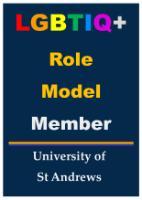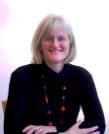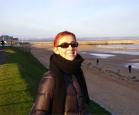University LGBTIQ+ Staff Role Model Members
Launched on National Coming Out Day 11 Oct 2016.
Dr Rebekah Widdowfield (Vice-Principal, People and Diversity)

Text provided August 2022: I joined the University in June 2022 as Vice-Principal, People and Diversity. The main purpose of my role is to ensure delivery of the University’s ambitions that equality, diversity, and inclusion should be at the heart of all that we do and to facilitate provision of the necessary strategy and support services, in areas such as Human Resources and Learning and Development, that help us realise that ambition.
As a gay woman in such a role, it is perhaps unsurprising that I have chosen to put myself forward as an LGBTIQ+ champion. But this is very much personally driven. When I was growing up in the 1980s, in a small town near Sheffield, there were no visible gay people in my life and very few in mainstream culture – and certainly no gay women. At school, gay was simply a term of abuse flung at any boy deemed ‘effeminate’. In the media and political debate, with the spread of HIV-AIDs and introduction of Section 28, it was too often portrayed as a death sentence and / or a threat to the moral fabric of society. Indeed, in 1987, the year I turned 17, three-quarters of the population thought that homosexuality was always (64%) or mostly wrong (11%) while just 13% deemed it not wrong at all (11%) or rarely wrong (2%).
Societal attitudes have, thankfully, shifted massively over the last 35 years supported by repeal of Section 28, the introduction of civil partnerships and, more recently, marriage equality, and a much greater visibility of LGBTIQ+ people in mainstream culture and professional life. Yet, that it is still a national news story when a male footballer comes out, tells us that there are still too many places where people do not feel able to be their true self. And it’s not just in sport. When I left the Scottish Government in 2017, an organisation, both progressive and visible, in its support for LGBTIQ+ rights, there were very few openly gay senior civil servants. Here, at the University, staff data (2020) records only 3.1% of staff as LGBTIQ+ with 11.3% preferring not to say (and no data for 29% of staff) and we know people have similar reservations about disclosing other aspects of identity such as disability, religion/belief and ethnicity.
It must, of course, always be a personal choice what people disclose about their lives, when, and to whom. But, as someone who in the past has not always felt able to be open about my sexuality, I want everyone to have the confidence to be who they are, not to have to hide, or feel they have to hide, aspects of their identity and lives. Visible role models are a key element of that, and I am delighted to stand alongside my fellow LGTBIQ+ champions to support and celebrate a diverse and inclusive St Andrews.
Iain Anderson (General Council Assessor)

Text provided Feb 2022: Having graduated from St Andrews in the late 1980s, I am Executive Chairman and co founder of Cicero/AMO - a global communications consultancy which works with FTSE and Fortune 500 blue chip organisations.
I was appointed as the first UK LGBT Business Champion by the UK Government in the autumn of 2021 where my role is to help drive best practice and drive forward equality at work for LGBT+ people. I have also been proud to be one of the Financial Times Global 100 LGBT+ Executives and one of the FT Allies of Women in Business.
I also sit on the University of St Andrews Court as a Non Executive Director and as General Council Assessor.
Professor Paul Hibbert MBA PhD FHEA
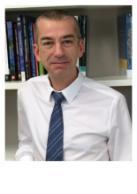
Assistant Vice-Principal (Dean of Arts and Divinity) (2021-Aug 2022)
Text provided in Sep 2016: I am the Dean of Arts and Divinity and a Professor of Management at the University of St Andrews. As Dean my role is largely focused on offering collaborative leadership and support to ten academic schools, involving over 500 staff and more than 5000 students. We all work together to support excellence in education and research. I have a responsibility to help everyone in this diverse community to have the opportunity to do their best by managing processes and practices – and by sorting things out when complications arise. Working with colleagues in the Proctor’s and Principal’s office, I also have responsibilities in relation to particular institutional partnerships, strategic projects and policy developments.
My research (serendipitously) dovetails with my role as Dean, since it is focussed on collaborative and relational processes of organizing and learning. I remain research active, and I have been successful in publishing my work in leading journals and gathering awards from the Australia and New Zealand, British and US Academies of Management. I am also strongly committed to using research to enhance teaching and learning – I support that aim through my own research output, and service to journals and learned societies in editorial and leadership roles. I also work with research ‘users’, through providing collaborative learning and leadership workshops and training events for agencies in the local government and healthcare sectors.
I am honoured to have the opportunity to help represent the LGBTIQ+ community in the University, and to support the University’s strong commitment to equality and diversity.
Professor Frances Andrews, BA, Phd, FRHistS
Text provided May 2018: I am a professor of Mediaeval History at the University of St Andrews, currently one of the Senate Assessors elected to the University Court (2012-2019) and also a vice-president of the Royal Historical Society. It is a professional weakness to be interested in the past, so I have to mention that I have been working at St Andrews since 1995, when I arrived as a new lecturer, a year out from my PhD and one of very few women then working in the newly formed School of History and IR. The awareness of equality and diversity issues has improved beyond recognition in the many years since. For me personally, it was a great pleasure to be the first woman to be appointed a professor in the School of History (in 2009). Was I the first gay person? Who knows?
My civil partner and I both have busy careers: she is based in England and we spend a lot of time in airports or on train stations as a result, which means that time together is very precious. We celebrated our civil partnership in 2007 with a big party and lots of children around us, hoping to make it a memorable (and unsurprising) event for the next generation.
My research focuses on the late middle ages in Europe, and in particular the wonderful history of Italy, which gives me a very welcome reason to travel there often, with or without my students. I have long taught courses on the way medieval Europeans marginalised or excluded different types of people, from heretics to sex workers to ‘homosexuals’ and the ‘others’ of the imagination. It isn’t a comforting story.
I am delighted to have been asked to help represent the LGBTIQ+ community in the University, and to support the University’s strong commitment to equality and diversity.
Dr Chris Hooley: Senior Lecturer in Theoretical Physics, Senate Assessor, and CM-CDT Operations Director
Text provided Sep 2016: Chris came to St Andrews as a Lecturer in 2005, and has been a Senior Lecturer since 2013. He leads a research group in the theory of strongly correlated quantum systems, teaches several related topics at the undergraduate and postgraduate levels, and is also Operations Director of the Scottish Doctoral Training Centre in Condensed Matter Physics (CM-CDT).
Chris is an active member and former branch president of the University and College Union, and a Senate Assessor on the University Court. He is also a proud Honorary Vice-President of PhySoc, the University's student physics society. Chris came out as a gay man in 1995, and he now undertakes representative work on LGBTIQ+ issues within the University, at the Scottish Trades Union Congress level, and within the international physics community.
Dr Elisabetta Girelli: Senior Lecturer in Film Studies
Text provided Jul 2017: I am a Senior Lecturer in Film Studies at the University of St Andrews. My work, both in regards to teaching and to research, has been focusing on issues of sexual and gender identity for a long time; Queer Theory and Studies is one of my chief fields of interests, and over the years I have hosted and/or participated in a variety of Queer-related events, from film screenings to Queer Question Time. I try (and usually succeed!) to include discussions of sexuality and gender in all my teaching.
As a seemingly straight-identified woman, I discovered a long time ago that the social assumptions surrounding heterosexuality did not at all fit my life experience, and I realised the crucial difference between heterosexuality and heteronormativity. The latter term covers the series of social and cultural norms bearing on sexual and romantic relations with the opposite sex: a set of spoken and unspoken rules that may effectively oppress and coerce an individual, limit possibilities, and make one feel (so wrongly!!!) a misfit. These norms include, for example, the rule that if one is ‘straight’ one will not ever feel any sexual or romantic interest in a person of the same sex; the rule that one has sex 2.5 times a week, with a person of the opposite sex of course, and usually with the same person; even the rule that one MUST be interested in sex at all! In regards to this last point, I’ve become increasingly aware of the topic of asexuality and of the asexual community, and I feel very strongly that asexual-identified people need to feel their identity recognised and validated.
Gender issues are of course equally crucial to my contestation of heteronormativity, and as a woman who has chosen not to have children, for example, I feel my choice is still questioned and criticised. I consider myself Queer because I do not, and will not, conform to social expectations placed on me in regards to my sexual and gender identity; I want to be who I am, I refuse to be boxed in a category, and I want to be free to change how I relate to sex and gender. The fluidity of Queer speaks to me, and it is one of the axes of my belief system: I celebrate difference, multiplicity, and non-conformity. You don’t have to conform. You don’t have to follow the rules. You make your own rules. I am always very happy to talk to any colleague (or indeed student!) who feels the need for a chat about any LGBTIQ+ issues – my office door is open, or you can email me.
Claire Scott: Sports Development Manager
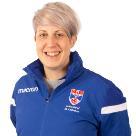
I am currently the Sports Development Manager, Saints Sport. You will probably find me in or around the sport centre in my full time capacity, or as a volunteer. In my spare time I currently coach the Womens 2nd Football Team. I joined the University of St Andrews Sport and Exercise Department in 2016. This was my first post within tertiary education having come from working mainly within the Third Sector and Local Authorities across Scotland. One area of my work is to work with the Athletic Union’s 60+ Student Sport Clubs in creating an inclusive culture and how we can ensure the sport centre is a safe, warm and welcoming environment to the LGBTQ+ community. As a member of this fantastic community, it was an exciting opportunity I could not wait to get started on!
This then prompted particular reflection around the support provided to our Saints Sport staff and service users. A few emails later, our friend from HR (EDI) asked if Saints Sport would be interested in becoming the first Sport Department in Scotland to sign up and complete the LGBT Youth Scotland Silver Charter to which my team and I jumped at the chance! The charter tool kit has really pushed our team to ensure we are delivering the best service and environment for our students, staff and community possible. I sit with a great group of Charter Champions from a range of Departments across the University including HR and student services. I am also the Saints Sport LGBT Champion for our Department and liaise regularly with student and staff on all things LGBTQ+.
I’m originally from the Isle of South Uist in the Outer Hebrides and now reside with my partner in Dundee, her name is also Claire, and we have the same middle name which can make family gatherings very confusing!
I am thrilled represent the LGBTIQ+ community in the University, and to support the University’s strong commitment to equality, diversity and inclusion.
Mx Avery Hawkins Assoc. CIPD (They/Them/Their): Organisational Development Coordinator, OSDS

Text provided Oct 2021: I joined the University in their current role in 2019, having originally relocated to St Andrews in 2017 with my partner who was starting their PhD. My role within the University is to help manage the University’s development provisions for employees across three key areas: wellbeing, mentoring, and inclusion in the workplace. My work involves driving the staff wellbeing strategy for the University, coordinating with other wellbeing-related services within the University to develop wellbeing initiatives and campaigns, and managing the Wellbeing Champions in professional services. I also help to manage the University’s centralised mentoring programmes, manage the mandatory training for University employees, and managing the Dignity and Inclusion Training Programme.
Prior to coming to St Andrews, my career was predominantly in human resource management. I hold experience in both the private and public sector, but much of my experience has been in non-department public bodies (such as Network Rail Ltd and Historic Environment Scotland). Over the years I have had the opportunity to draw inclusion-related work into my job. I started out supporting policy reviews with staff networks, developing inclusion-focused training, through to being a founding member of the first LGBTIQ+ staff network at Historic Environment Scotland. I now have the pleasure of working closely with colleague in the Equality, Diversity, and Inclusion Team and the Centre for Educational Enhancement and Development to support the University in creating training materials and resources that can help inform and support all member of the University community treat each other with respect and dignity. I am also the co-chair for the EDI Unit Representatives Forum and the OSDS representative at the Central EDI Committee.
For me, being non-binary is not the same as have no gender or being a man today and a woman tomorrow. It is all of these things and none of them. My experience of gender is quite fluid and subject to change. I have identified that my internal feelings about myself and towards others when I am at work, or in a professional context, feel innately feminine, and thus I feel more comfortable presenting myself as feminine in the workplace. I am still non-binary and I wouldn’t describe myself as a woman but I am more feminine in that context. In other contexts, I have felt more masculine and others just neutral where no particularly gendered feelings are present. Sometimes my presentation reflects these feelings and sometimes it doesn’t. (Frankly, it can be a case of how tired I was when I get up in the morning dictating how I am going to present myself.)
As an out non-binary person, I am in a position to be a positive and visible representative of non-binary people in the workplace. This often comes with the side-effect of being an educator about the aspects of queerness that I have experience of, which has its pros and cons. I want to be available for people to come to me and ask questions so those non-binary people or bi/pansexual people can get on with their jobs and lives without being harassed by questions they don’t want to feel obligated to answer. It is for this reason that I supported the development of the ‘pronoun and gender-inclusive language training video’, to provide everyone with a resource that is freely available to help people understand how to support trans and non-binary people. I look forward to the opportunities available to me to help expand on this training to support the LGBTIQ+ community in the workplace.
Kathryn Herschell: Equality & Diversity Awards Adviser, EDI
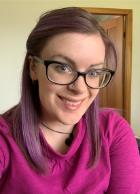
Text provided Sep 2021: I’m Kathryn, and my pronouns are they/them or she/her. I joined the University of St Andrews in August 2021 to work in the Equality, Diversity and Inclusion (EDI) team. I’m proud to be bi and am a vocal advocate for LGBTIQ+ people. I’m also neurodivergent, chronically ill, have an invisible disability, and have experience with mental health issues. I am delighted to be a visible bi role model at the University, and an ally to other minority and underrepresented groups.
Prior to coming to St Andrews, I have been a trade union equalities rep, set up staff networks for LGBTQ and disabled people, organised participation in Pride events, and delivered training on equality and diversity in education. I am conversant in BSL, which I studied a few years ago as part of improving accessibility at a previous workplace.
For me, being bi means that I can be attracted to people of all genders and none. When I was younger, I was ashamed of my orientation and didn’t talk about it because of the biphobia that’s present in so much of society. I was told bi people were greedy, attention-seeking, and unable to decide if they were gay or straight. It wasn’t until I met some other bi and queer people that I really started to realise that my identity is valid, and worthy of celebration. When I came out, I found not just acceptance, but community, supportiveness, and allyship.
Outside of work, I can usually be found wild swimming (yes, even in winter), riding my beloved e-bike, or crocheting. As someone who’s new to St Andrews, I’m keen to find out where the best coffee and gluten free cakes are to be found!
Further online information:
- Gender Reassignment
- Sexual Orientation
- To become a role model or join the Staff LGBTIQ+ Network please email: diversity@st-andrews.ac.uk
- Lesbian, Gay, Bisexual, Trans, Intersex & Queer (LGBTIQ).
- LGBTIQ+ Role Model member logo (PDF, 135 KB)
